
Camping Cot vs Air Mattress: Which Wins for Outdoor Zzz's?
Discover the best sleep solution for your next camping trip with our in-depth comparison of camping cot vs air mattress. Make the right choice!
You're probably gearing up for your next camping adventure and pondering one of the classic dilemmas: should you opt for a camping cot or an air mattress?
Well, you're in the right place to find out.
In this article, we'll dive deep into the world of camping cots and air mattresses, comparing them side by side so you can make an informed decision for your next trip under the stars.
After all, a good night's sleep is crucial, especially when you're out in the wilderness.
Real World Experiences & Tips from Campers
Cot Advantages:
- Elevation from Ground: Cots keep you higher off the ground, which can be warmer and more comfortable in certain conditions.
- Durability: Generally more durable and long-lasting compared to air mattresses.
- No Need for Refilling: Unlike air mattresses, cots don't require air refills, avoiding the issue of air leakage.
- Better with Tent Heaters: Safer to use with tent heaters as compared to air mattresses.
- Comfort with Add-ons: Adding a thin memory foam pad on the cot can enhance comfort significantly.
Air Mattress Advantages:
- Comfort: Many find air mattresses to be very comfortable, akin to a traditional bed.
- Space-Saving: When deflated, they can be rolled up tightly, saving valuable packing space.
- Suitable for Restless Sleepers: Some users find air mattresses better for restless sleep, especially when accommodating more than one person.
General Considerations:
- Headroom in Tent: The height of cots might be an issue in dome tents with limited headroom.
- Combination Use: Some campers suggest using a cot in combination with a pad for optimal comfort and insulation.
Understanding the Basics
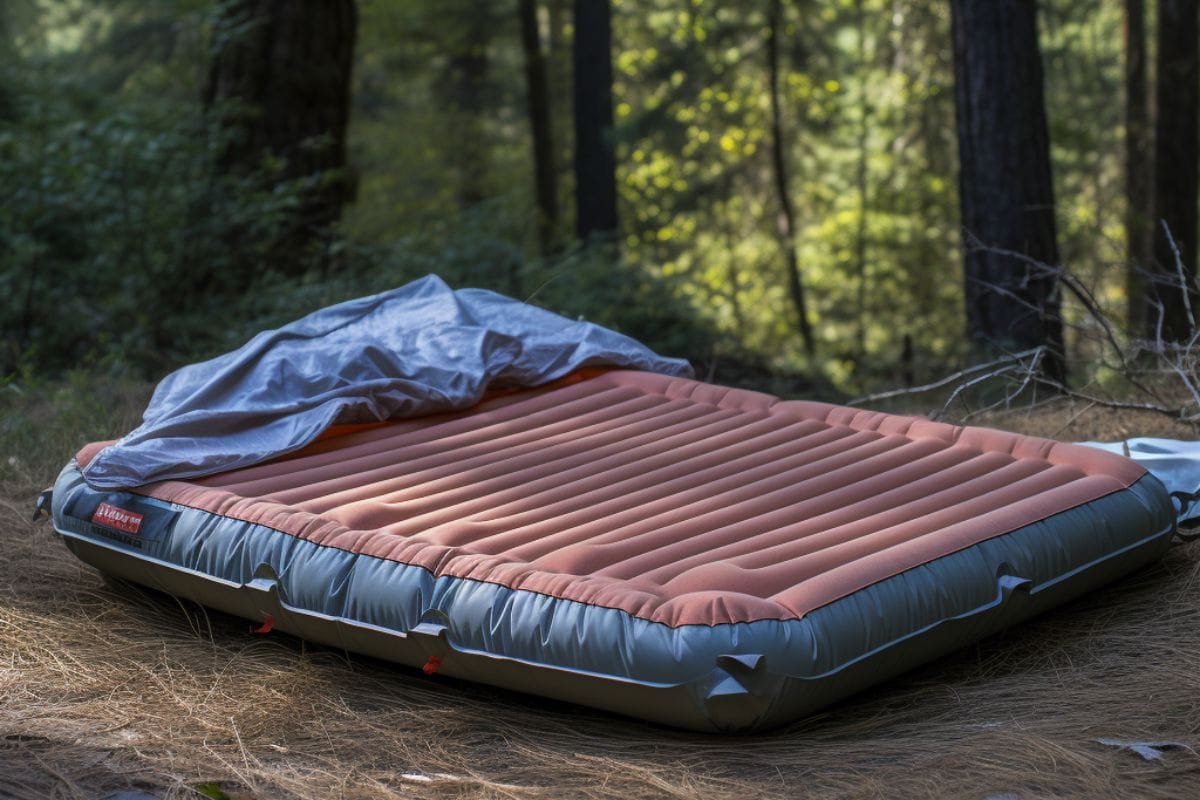
What are Camping Cots and Air Mattresses?
Camping cots, to put it simply, are portable beds with a frame, usually made of lightweight metal such as aluminum, and a fabric surface.
They elevate you off the ground, which is a blessing in colder conditions since it helps reduce heat loss. Plus, being off the ground means fewer bugs to bother you and less dampness from the ground seeping into your sleeping space.
Air mattresses, on the other hand, are inflatable beds. They can range from basic models that just get the job done to sophisticated ones with features like adjustable firmness and built-in pumps.
Air mattresses are known for their comfort, mimicking the feel of your regular bed. They conform to your body, providing a cushioned sleeping surface that can be a real treat after a long day of outdoor activities.
A Brief History

Now, let's take a quick stroll down memory lane.
Did you know that camping cots have been around for centuries?
They were initially used in military campaigns, offering soldiers a better rest away from rocky or damp ground. Over the years, they've evolved from bulky, heavy contraptions to the lightweight and compact designs we see today.
Air mattresses have a more recent history, with the first patent filed in the early 20th century.
Initially, they were a luxury item, but advancements in materials and production techniques have made them accessible to all.
Today's air mattresses are durable, easy to inflate (thanks to battery-operated or built-in pumps), and more resistant to punctures.
Types and Varieties
Alright, now that you've got the basics down, let's explore the different types of camping cots and air mattresses available.
This way, you can pinpoint exactly what suits your needs and personal preferences for your next outdoor adventure.
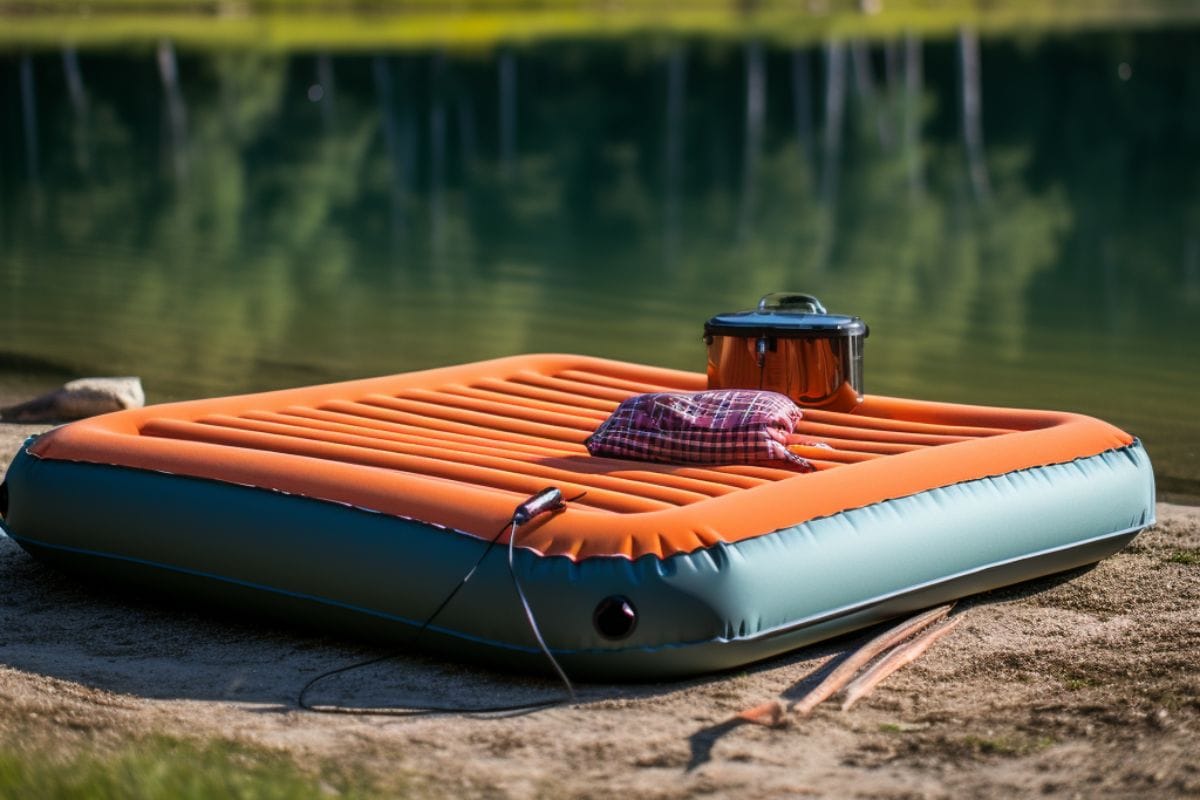
Different Types of Camping Cots and Air Mattresses
When it comes to camping cots, think beyond just a simple frame and fabric. There's a variety out there, each with its unique features.
- Standard Camping Cots: These are your basic cots, usually with a steel or aluminum frame and a durable fabric like polyester or nylon. They're sturdy and can hold a fair amount of weight. If you're looking for something simple and efficient, this is your go-to.
- Lightweight Cots: Ideal for backpackers, these cots are made with ultra-light materials. They might not be as robust as the standard ones, but they're perfect when you need to keep your pack light.
- Luxury Cots: Want a bit of pampering even while camping? Luxury cots come with extra features like foam padding, side tables, or even a built-in tent! They're heavier but perfect for car camping.
- Convertible Cots: These are the transformers of the camping world. Convertible cots can double as chairs or loungers, offering versatility that's great for those who want multi-functional gear.
Moving on to air mattresses, they're not all just a slab of air-filled, plastic material. Here's what to look for:
- Standard Air Mattresses: These are the common ones you'll find in most stores. They usually require an external air pump to inflate. They're great for general use and come in various thicknesses and sizes.
- Self-Inflating Mattresses: These mattresses have a foam layer that expands and pulls air in when you open the valve. They're a fantastic blend of comfort and convenience, especially if you dislike manually pumping air.
- Battery-Operated or Built-in Pump Mattresses: For those who want the ultimate ease, these mattresses come with a battery-operated or built-in pump. Just press a button, and voilà! Your bed is ready in minutes.
- Double Height Mattresses: If you prefer a bed-like experience, go for these. They're taller, making it easier to get in and out of bed. Plus, they often come with multiple air chambers for better support and comfort.
- Specialty Mattresses: Designed for specific needs, like ones that contour to the body for side sleepers or have a higher R-value for insulation in colder conditions.
Advantages and Disadvantages of Camping Cots
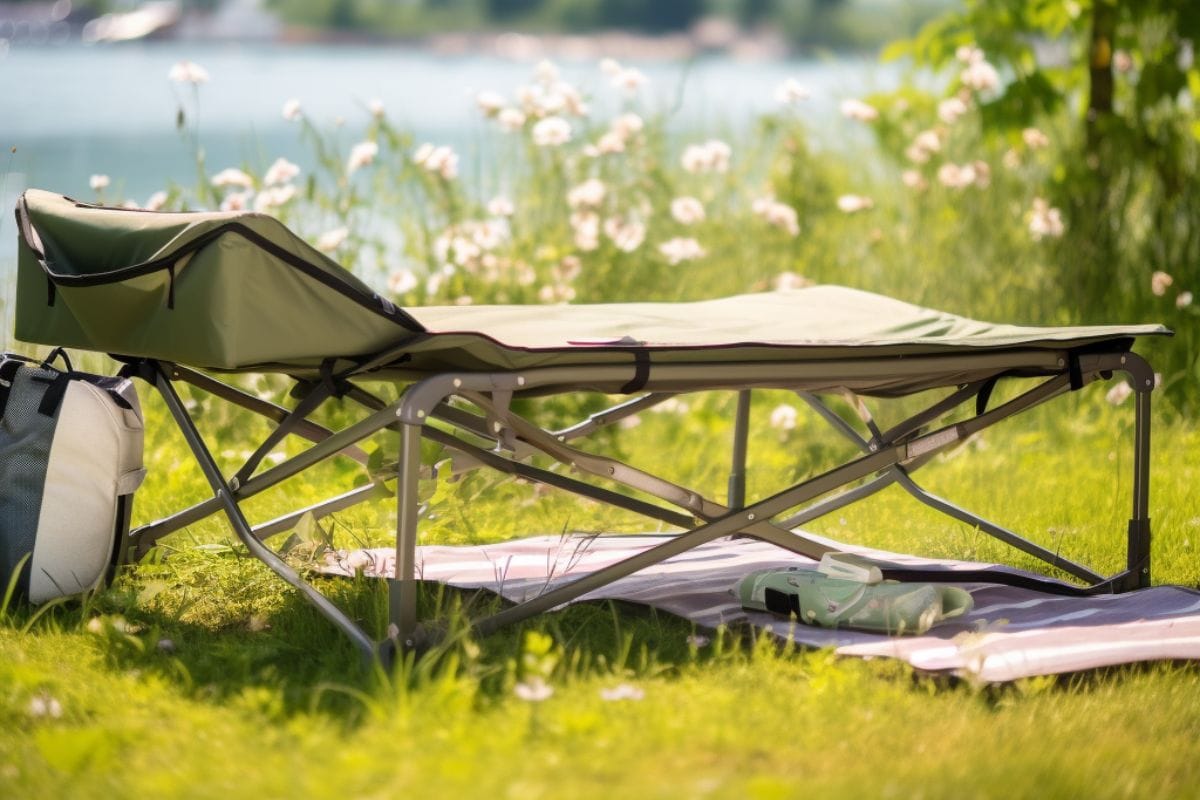
Pros:
- Elevated Sleeping Surface: One of the biggest perks of a camping cot is that it lifts you off the ground. This elevation keeps you away from cold, damp surfaces, which is particularly beneficial in chilly weather. Scientifically, it's all about reducing heat transfer – the air under the cot acts as an insulator, keeping you warmer than if you were sleeping directly on the ground.
- Durability: Most camping cots are built to last. They typically have a sturdy frame (steel or aluminum) and a tough fabric. This means they can endure a lot of wear and tear, making them a great long-term investment for frequent campers.
- Storage Space Underneath: The space beneath a camping cot can be a real asset. You can store your gear underneath, keeping your tent more organized and saving precious space.
- Health & Comfort: For those with back issues or who find it hard to get up from ground level, a cot can make a big difference. It offers a firmer sleeping surface and is easier to get in and out of, compared to an air mattress.
Cons:
- Weight and Portability: Cots are generally heavier than air mattresses, making them less ideal for backpacking. Even the lightweight models can add significant weight to your pack.
- Setup Time and Effort: While it's not rocket science, setting up a camping cot can take more time and effort than inflating an air mattress. This could be a bit of a hassle, especially after a long day of hiking.
- Less Insulation: Despite keeping you off the cold ground, cots don't provide as much insulation as air mattresses. You might need an extra sleeping pad or blanket on colder nights.
- Size and Space in Tent: Cots take up more room in a tent compared to air mattresses. If you're sharing a tent, this could mean less floor space for others.
Advantages and Disadvantages of Air Mattresses
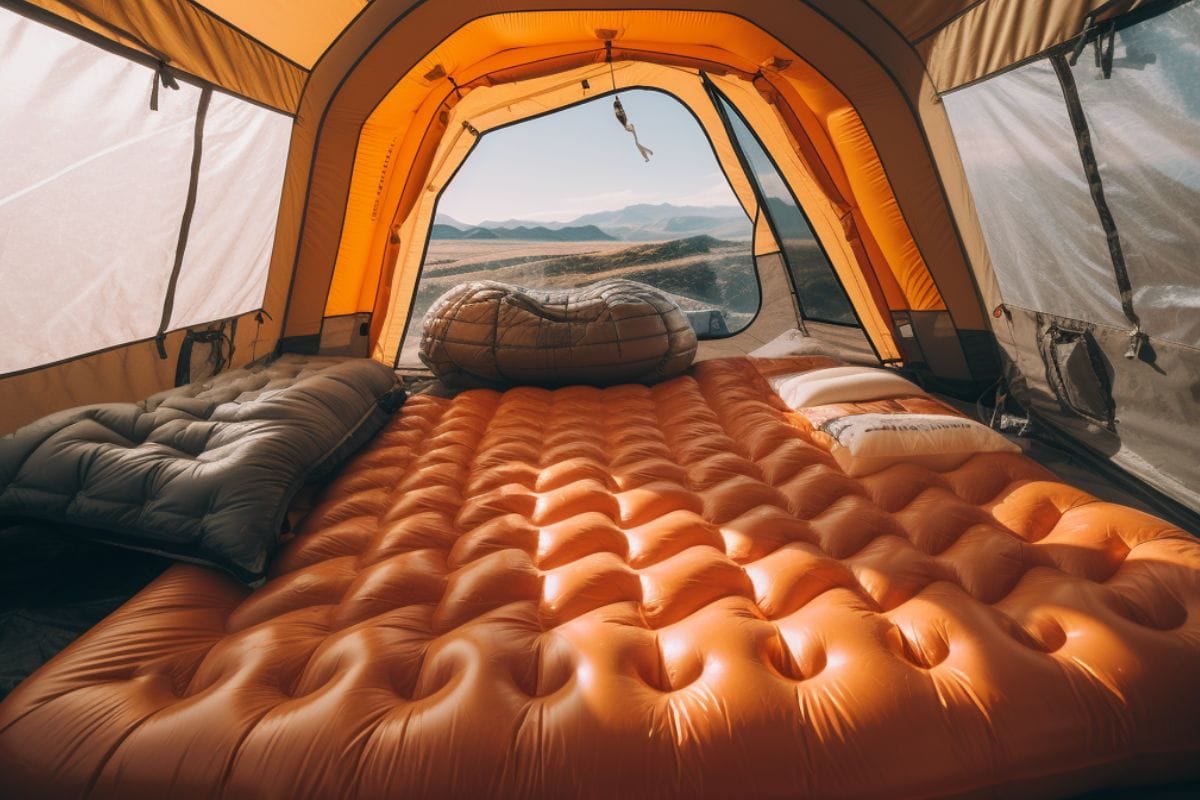
Pros:
- Adjustable Firmness: One of the best things about air mattresses is the ability to adjust their firmness. Need it softer or firmer? Just add or release some air. This customization can lead to a more comfortable sleep, tailored to your preference.
- Comfort and Body Support: Air mattresses contour to your body, providing support and reducing pressure points. This can result in a more restful sleep, especially for side sleepers.
- Compact and Lightweight: When deflated, air mattresses take up very little space and are quite light. This makes them ideal for backpacking or when you have limited storage space.
- Versatility: You can use an air mattress both inside and outside of a tent, making it a versatile piece of camping gear.
Cons:
- Risk of Punctures and Leaks: The biggest downside of an air mattress is its vulnerability to punctures and leaks. A single sharp rock or twig can mean a night spent on the hard ground.
- Faulty Valves: Valves can sometimes fail, causing the mattress to slowly deflate overnight. Nothing's worse than waking up on a deflated bed!
- Cold Air Effect: Air mattresses filled with cold air can lead to a chilly sleeping experience, as they don't insulate well against the ground temperature. This means extra insulation is needed in colder environments.
- Inflation Time and Effort: Unless you have a mattress with a built-in or battery-operated pump, inflating an air mattress can be a bit of a workout.
Key Considerations for Campers
So, you've got the pros and cons of both camping cots and air mattresses down. Great!
But before you make that final decision, let's dive into some key factors that could sway your choice. It's all about matching your personal camping style and needs to the right sleep system.
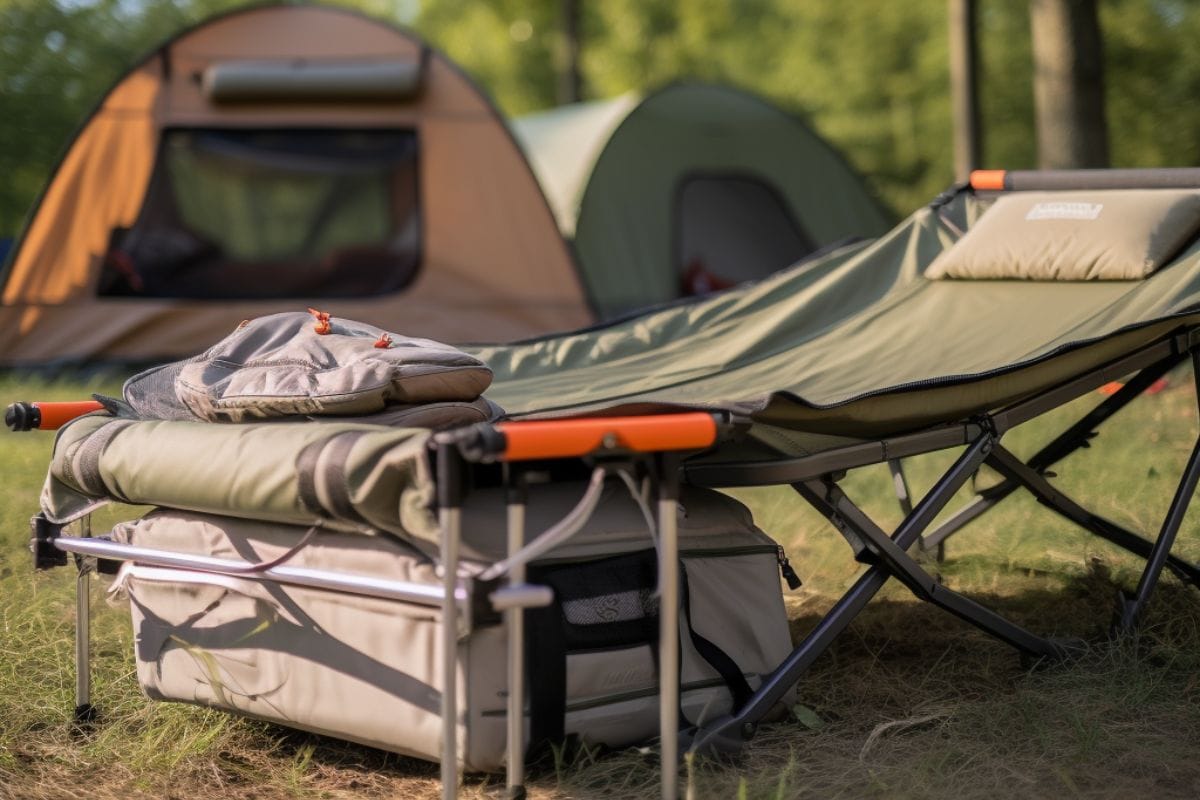
1. Sleeping Surface Preferences
- Cot Comfort: If you prefer a firmer sleeping surface, a cot might be your best bet. It provides a stable, flat surface, which can be kinder to your back. Plus, no sinking in the middle of the night!
- Air Mattress Softness: For those who crave that plush, bed-like feel, an air mattress is the way to go. It conforms to your body, offering a cushioned surface that can be heavenly after a day of trekking.
2. Sleeping Positions
- Side Sleepers: If you're a side sleeper, an air mattress can offer better support and comfort. It cushions your hips and shoulders, reducing pressure points.
- Stomach Sleepers: Stomach sleepers might find a cot more comfortable as it prevents the awkward sinking feeling you can get with an air mattress, making it easier to maintain a neutral spine position.
3. Insulation and R-Value
- Understanding R-Value: R-value is a measure of thermal resistance. The higher the R-value, the better the insulation. This is especially important in colder conditions to prevent heat loss to the ground.
- Cot Insulation Needs: Cots generally have a lower R-value since they're elevated off the ground. However, this means you might need an additional sleeping pad or underquilt for insulation on colder nights.
- Air Mattress Insulation: Many air mattresses have higher R-values, making them better insulated and warmer. But remember, cold air inside the mattress can still be an issue, so check the R-value before buying.
4. Ease of Setup and Portability
- Cot Setup: Cots require assembly, which might not be everyone's cup of tea after a long hike. They're also generally heavier and bulkier, making them less ideal for backpacking.
- Air Mattress Setup: Air mattresses can be simpler to set up, especially those with built-in pumps. They're also lighter and more compact when deflated, making them a good choice for space-saving.
Situational Suitability
You're now armed with the basics, pros, cons, and key considerations. But wait, there's more!
Let's talk about the situational suitability of camping cots and air mattresses.
The truth is, certain situations and environments make one option a clear winner over the other. Understanding this can be a game-changer for your camping experience.
Best Uses for Camping Cots vs Air Mattresses
1. Car Camping: The Luxury of Space
- Camping Cots: In car camping scenarios, where you're not limited by weight or space in your backpack, cots are a fantastic choice. They offer comfort, elevation, and don't require you to sacrifice tent space for a bulky mattress.
- Air Mattresses: Also great for car camping, especially if you're sharing a tent. They provide a home-like sleeping experience and can be easily stored in the car during the day for more tent space.
2. Hot Weather Camping: Staying Cool
- Camping Cots: Excellent for hot weather! The elevated design of a cot allows for air circulation underneath, helping to keep you cooler during those warm summer nights.
- Air Mattresses: They can get a bit warm due to body heat being trapped in the mattress. If you're going for an air mattress in hot weather, opt for one with a breathable cover.
3. Rainy or Cold Conditions: Staying Dry and Warm
- Camping Cots: Superb for rainy conditions as they keep you off the damp ground. However, remember to add an extra insulating layer for colder weather since air circulating underneath can reduce warmth.
- Air Mattresses: They're closer to the ground, which might be less ideal in wet conditions. But with a higher R-value, they provide better insulation against the cold ground, making them a cozy choice when temperatures drop.
4. Backpacking: Weight and Portability
- Camping Cots: Typically not suitable for backpacking due to their weight and size. However, if you're up for the challenge and prioritize comfort over weight, there are lightweight models available.
- Air Mattresses: The go-to for backpackers. They're lightweight, compact, and can be easily rolled up and tucked into a backpack. Just make sure you have a reliable pump or good lungs to inflate it!
5. Tent Space and Setup
- Camping Cots: They take up more vertical space but less floor space, which can be a strategic advantage in smaller tents. Setup might take a bit longer, but the effort can be worth it for the comfort and elevation they provide.
- Air Mattresses: They're flat and can take up significant floor space, depending on the size. The setup is usually quicker, especially with a built-in or battery-operated pump. Just remember, the larger the mattress, the less room for other gear in your tent.
Additional Accessories and Considerations
Alright, you're nearly set to make that all-important decision between a camping cot and an air mattress.
But before you do, let's talk about some extra gear and tips that can elevate your outdoor sleep experience from good to great, no matter which option you choose.
Enhancing Your Sleep Experience in the Outdoors
- For Both Cots and Air Mattresses: A good sleeping bag isn't just about warmth; it's about comfort. Choose one that suits the climate you're camping in. For colder nights, a sleeping bag with a higher insulation rating is key, while a lighter, more breathable bag works for warmer weather.
- Primarily for Air Mattresses: Always pack a repair kit. Air mattresses, while comfy, are prone to punctures. A quick patch-up can save your night. Some air mattresses come with their own, but it never hurts to have an extra.
- For Cots: Although less likely to need repairs, having some basic tools to tighten any loose screws on your cot can be a lifesaver.
- For Air Mattresses: If your mattress doesn't have a built-in pump, consider a battery-operated or manual air pump. Trust me, you don’t want to be out of breath before bed trying to inflate it manually!
- For Cots: Remember, air circulation under the cot can lead to heat loss. Use an insulating pad or foam mattress on top of the cot in colder weather. This extra layer can make a huge difference in keeping you warm.
- For Air Mattresses: An insulated or self-inflating mattress can help mitigate the cold air effect. Alternatively, place a blanket or foam pad on top of the mattress for extra insulation.
- General Tip: Always clear your tent site of sharp objects like rocks or sticks before setting up. This is crucial for air mattresses to prevent punctures, but it's also good practice to protect the bottom of your tent and cot fabric.
- Pillow Talk: Don't forget a pillow! A small, compressible camping pillow or even a bundled-up fleece jacket can make a big difference in your sleep quality.
- Positioning Your Bed: Think about where you set up your cot or air mattress. Avoid uneven ground. For cots, ensure it's level so you won't end up sliding off in the middle of the night. For air mattresses, find a spot that minimizes the risk of punctures.
Maintenance and Care

You're almost ready to hit the great outdoors with your ideal sleep setup, but wait!
Let's chat about keeping your camping bed in top shape.
Whether you choose a cot or an air mattress, proper maintenance, and care are key to ensuring longevity and comfort for many camping trips to come.
Maintaining Your Air Mattress
- Prevent Punctures: The biggest enemy of air mattresses is punctures. Always clear the tent area of sharp objects before setup. Consider placing a protective tarp under your mattress for extra safety.
- Proper Inflation: Over-inflating can stress the seams, while under-inflating can lead to an uncomfortable sleep and increased wear. Inflate your mattress to the recommended level for the perfect balance.
- Cleaning and Storage: After each trip, make sure to clean your mattress with a mild soap and let it air dry completely. Store it in a cool, dry place, preferably in a storage bag to protect it from dust and moisture.
- Regular Checks: Before each trip, give your mattress a quick test inflation at home to check for any leaks or issues.
Caring for Your Camping Cot
- Frame Inspection: Regularly check the cot frame for any signs of wear or damage, especially at the joints. Tighten any loose screws and replace any damaged parts promptly.
- Fabric Care: The fabric on your cot can collect dirt and moisture. Clean it with a mild soap and let it dry completely before storing.
- Folding and Storage: Fold your cot properly as per the manufacturer’s instructions. Improper folding can warp the frame over time. Store it in a dry place and consider a carry bag to protect it from dust and moisture.
- Rust Prevention: If your cot has a metal frame, keep an eye out for rust, especially if you camp in humid or wet conditions. Applying a rust inhibitor can prolong its life.
Longevity and Common Issues
- Air Mattress Longevity: With proper care, an air mattress can last several years. Regular cleaning, proper inflation, and careful storage are the keys to longevity.
- Dealing with Leaks: If you find a leak, most air mattresses can be easily patched with a repair kit. Always have one handy.
- Cot Longevity: Cots can last even longer due to their sturdy construction. The main things to watch out for are fabric wear and frame damage.
- Frame Issues: In case of frame damage, check if the manufacturer offers replacement parts. This can be a more cost-effective solution than buying a new cot.
Final Recommendations and Tips
Phew! You've journeyed through the ins and outs of camping cots and air mattresses.
Now, let's wrap it up with some final nuggets of wisdom to help you make that perfect choice for your camping style.
Your Camping Style and Sleep System
- Backpackers: Lightweight and easy-to-carry options are key. A light air mattress or a compact, lightweight cot is your best bet.
- Car Campers: You've got the luxury of space, so why not enjoy it? Opt for a comfy air mattress or a deluxe cot with extra features for that home-away-from-home feel.
- Solo vs. Group Campers: Solo campers might prefer a single-sized air mattress or cot, while group campers could consider larger air mattresses or multiple cots, depending on tent space.
Consider Your Body Weight and Preferences
- Body Weight: Make sure to check the weight capacity of your chosen sleep system. Durable and robust options are available for all body types.
- Sleep Preferences: Side sleepers often find air mattresses more comfortable, while those who prefer a firmer bed might lean towards cots. Think about what makes you comfy in bed at home.
Need More Space, Comfort, or Durability?
- More Space: For maximizing tent space, cots are a great choice. Their elevated design frees up floor space for storage.
- More Comfort: If comfort is king (or queen) for you, then an air mattress, especially one with adjustable firmness, can be like sleeping on a cloud.
- Durability: Cots generally win in the durability department, with their sturdy frames and fabric.
Frequently Asked Questions
Is sleeping on a camping cot comfortable?
Yes, sleeping on a camping cot can be comfortable. It keeps you off the ground and offers firm support, great for your back.
What is the most comfortable thing to sleep on camping?
The most comfortable thing to sleep on while camping is often an air mattress. It's soft and feels like a regular bed. But for firm support, a camping cot is also a good choice.
What's better than an air mattress for camping?
For some campers, a camping cot is better than an air mattress especially if you prefer a firm sleeping surface. It's sturdy, keeps you off the ground, and doesn't need air. Also, sleeping pads are a lightweight option that's easy to carry.
What are camping cots used for?
Camping cots are used for sleeping off the ground when camping. They keep you away from bugs and cold ground. Cots are also handy for storing gear underneath or sitting on like a bench.
Before You Go...







